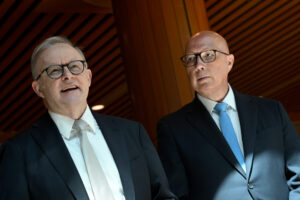The Business Council of Australia and the Liberal party just lost a debate with Bill Shorten about the economy. Badly. The days where expensive suits and even more expensive modelling were enough to win a public debate about “what the economy needs” are over. The days where newspaper editors could shift votes are over. The days where governments can deliver unpopular policy in their first term safe in the knowledge they will win a second term are over. The question for the representatives of big business is not whether they can turn back the clock, but whether they want to catch up with the new reality.
Until the BCA prioritises the big issues of climate change and inequality they have no chance of claiming the policy or reform high ground. Arguing that the nation’s number one priority is to deliver tax cuts for big business looks as self-serving as it is. Playing on workers’ fears about job security helped destroy the carbon tax and the mining tax, but those tactical wins have become strategic disasters. Having convinced voters that they are entitled to secure work, those same voters have no faith that the BCA or Liberal Party are committed to delivering it. Whoops.
It is no longer inevitable that the representatives of big business will get a seat at the reform table; indeed their conduct in the last decade suggests they don’t deserve one. Like Tony Abbott and Boris Johnson, the BCA has confused having the power to break policy with having the power to make policy. Unlike the small business sector, which has been effective in delivering what its members want, the BCA spent its political capital vetoing sensible reforms that hurt some of their biggest members while delivering nothing for the rest.
If the business community do want a seat at the reform table they need to abandon the idea that they will sit at its head. They need to figure out what they are willing to help other groups achieve. They must admit there are more pressing goals than delivering tax cuts to themselves. And they need to stop accusing anyone with the temerity to question their claims of being “anti business”. Arrogance won’t build the bridges big business clearly needs.
If the BCA were serious about reform they would take economics more seriously. The carbon tax wasn’t a “wrecking ball” for the economy; it was sensible reform. The mining tax wasn’t a fundamental threat to the mining industry; it was an opportunity to manage the macroeconomics of a mining boom. And a royal commission into the banks isn’t a source of instability, but a prudent opportunity for oversight of those who manage $1.5 trillion of other people’s money. But the BCA simply rages against anything its most powerful members would rather avoid.
Rather than engage constructively in the community’s debates about the community’s priorities and the community’s expectations, those who speak for big business have chosen instead to trivialise those concerns. But as last week’s election shows, it’s the demands of the self-appointed business leaders that are trivial.
The BCA and Liberal election strategies were based on the assumption that voters who were scared of losing their jobs would reach for the bitter medicine of tax cuts for big business and service cuts for themselves. They were wrong. Voters have always known that such medicine was bitter, but they no longer believe that the expensive elixir trickling down their throat will cure what ails them.
If the BCA was serious about economics, science, or democracy it would be leading calls for a carbon price and the end of fossil fuel subsidies to fund improved services and genuine tax reform. Such a grand bargain would be good economics and politics. Win win. But that seems about as likely as Boris Johnson admitting he was just taking the piss about Brexit. Rather than blame themselves, it seems the same old business voices are going to ramp up the same old scare campaigns that won them the carbon and mining tax campaigns without realising that the more scared voters are, the less they will trust big business. There are none so blind as will not see.
Dr Richard Denniss is chief economist at The Australia Institute @RDNS_TAI
Between the Lines Newsletter
The biggest stories and the best analysis from the team at the Australia Institute, delivered to your inbox every fortnight.
You might also like
Sorry BCA – the data shows businesses like investing in Victoria
Despite what the Business Council of Australia would wish you to believe, Victoria is one of the most popular places to invest in Australia.
5 ways and 63 billion reasons to improve Australia’s tax system
With a federal election just around the corner, new analysis from The Australia Institute reveals 63 billion reasons why our next Parliament should improve the nation’s tax system.
Eight things you need to know about the Government’s plan to change Australian elections
And eight ideas to improve it


